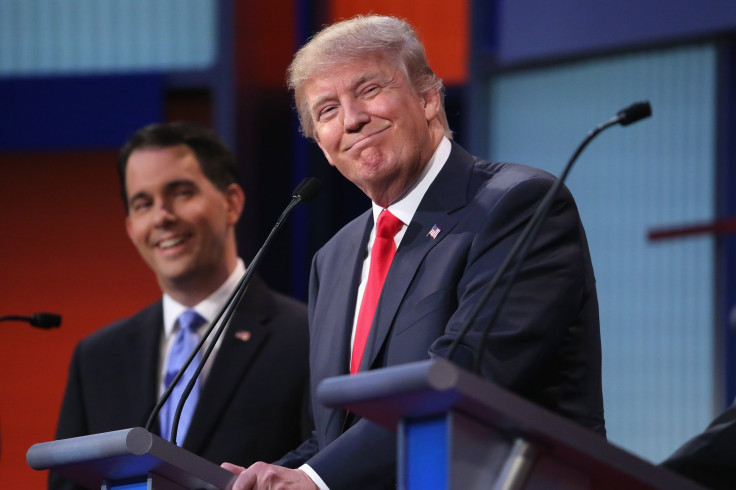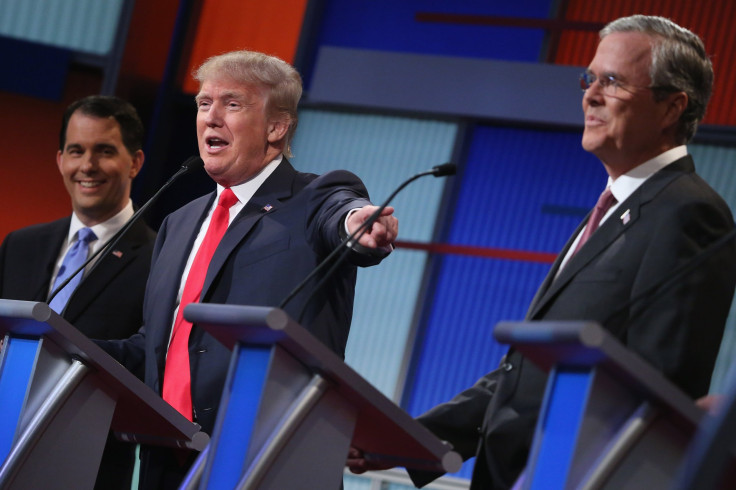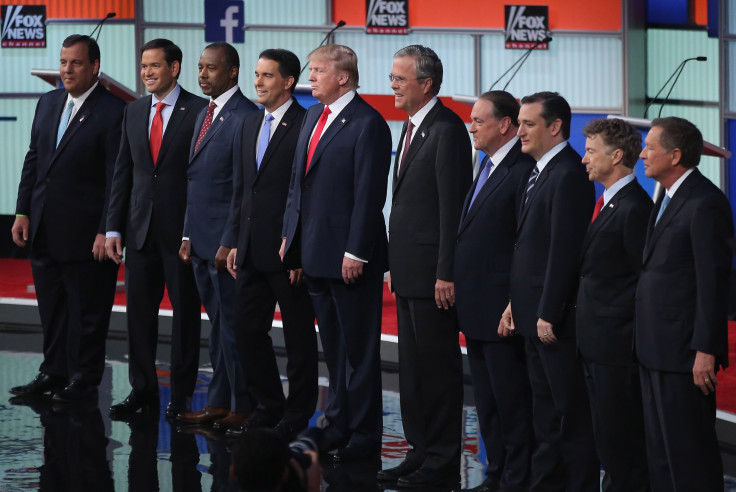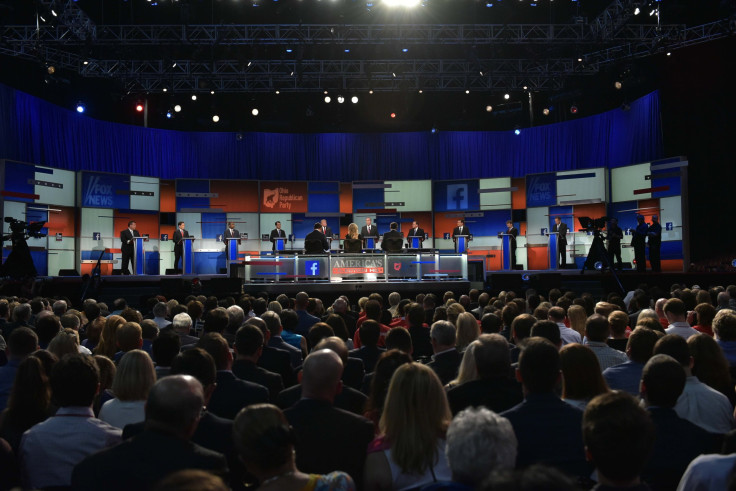Republican Debate: How Did Donald Trump, Jeb Bush, Marco Rubio, Mike Huckabee, Ben Carson, Mike Huckabee And Other GOP Candidates Do?

WASHINGTON -- It was clear that the Republican Party's first prime-time debate was going to be explosive after the first question: Raise your hand if you won't pledge to support the ultimate GOP nominee and not run an independent campaign. Donald Trump’s hand went up.
Boos erupted but Trump, as usual, was unapologetic. “I cannot say, I have to respect the person, who is not me,” he declared. “I can totally make that pledge if I’m the nominee that I will not run as an independent.”
Participants in a focus group led by Frank Luntz on Fox News after the debate expressed disappointment about Trump's stand, and said they had found him angry and off-putting. (After the debate Trump told Sean Hannity that his refusal to take the pledge was "leverage" and that he might at some point reconsider.)
When Trump refused to pledge, the first fight broke out. “He buys and sells politicians!” Kentucky Sen. Rand Paul shouted from across the stage. “He’s already hedging his bets.” Throughout the debate, Paul frequently interjected himself from the wing of the stage.
And so a night marked by boos and cheers, jeers and verbal punches began.

It was the most anticipated and hyped event of the campaign season, so far. And it delivered. The top 10 Republicans in the polls for president were on one stage in a debate hosted by Fox News Channel. The first round went to the candidates who couldn’t manage to poll above 2 percent. The winner clearly was former Hewlett-Packard CEO Carly Fiorina. And while intense at times, the first debate was cordial.
The main event was anything but.
There were standouts in the debate. Trump held onto the spotlight -- for better and worse. Florida Sen. Marco Rubio shined with an immigration response and a line that if 2016 is "a resume election, then Hillary Clinton will win."
"How's she going to lecture me on living paycheck-to-paycheck, when I was raised paycheck-to-paycheck?" he asked.
New Jersey Gov. Chris Christie received accolades for his own intense exchange with Paul. And Ohio Gov. John Kasich (obviously popular with the hometown crowd) won a warm response by saying he would attend a same-sex wedding.

Texas Sen. Ted Cruz, retired neurosurgeon Ben Carson and former Arkansas Gov. Mike Huckabee struggled to break through to the crowd, although Huckabee's evocation of Ronald Reagan's famous "trust but verify" comment drew warm applause. Even Wisconsin Gov. Scott Walker got less airtime than some of the other front-runners.
Former Florida Gov. Jeb Bush barely adhered to the first rule of debate: Do no harm. He remained mostly silent, didn’t have a strong moment and seemed more timid and less assertive on the stage next to Trump. But Bush didn't provide any new ammunition for opponents, and gave a strong and clear defense of his support for Common Core education standards. Only once did he engage with the front-runner, and it was to disavow reports that he had privately been critical of Trump and to offer criticism of his tone.
And that was the most pleasant exchange with Trump.

Trump didn’t hold back. He was providing attack lines and surprising the moderators from the beginning. And while Beltway political commentators have been making, incorrectly, the case that Trump’s brash talk would eventually turn off voters, his calling the nation’s leaders “stupid” and insulting everyone from Megyn Kelly to Paul, was right in line with the kind of talk that has sent him to the top of the polls.
When pressed by the Kelly, who was moderating, Trump took a swing. “Honestly, Megyn, if you don't like it, I'm sorry,” he said. “I've been very nice to you, although I could probably not be based on the way you have treated me. But I wouldn't do that."
When Paul interrupted him, Trump accused Paul of not listening. “You’re having a hard time tonight,” Trump said.
And when Trump got asked about his favorite topic -- illegal immigration -- he first said that reporters who covered his announcement are “a generally dishonest lot,” and then he went after President Barack Obama. “Our leaders are stupid, our politicians are stupid and the Mexican government is much smarter,” he said. “The Mexican government is much smarter, much sharper, much more cunning.”
One tense moment didn’t involved Trump: a moment of shouting between Christie and Paul. The moderators set it up, asking the two men to revive their ongoing dispute about the Patriot Act. Paul has been the most vocal critic of the federal anti-terrorism law, which was enacted following the Sept. 11, 2001, terror attacks, and led a crusade in the Senate to repeal portions of it. Christie was in turn critical of Paul, saying Paul would be to blame if the nation suffered another terrorist attack.
“When you’re sitting in the subcommittee just blowing hot air about this, you can say things like that,” Christie shot at Paul. Christie accused him of pushing the issue only to cut campaign ads to raise money.
Paul returned fire, saying that Christie was siding with Obama. “I know you gave him a big hug, and if you want to give him a big hug again, go ahead,” Paul said, referring to the controversial tarmac embrace in 2012, after the president arrived in New Jersey to join Christie on a tour of Superstorm Sandy damage.
Carson was mostly quiet and restrained but seemed to connect with the audience as the debate ended by talking about his work as a neurosurgeon. He "stuck the landing," as the commentators said.
Cruz also got positive reviews from the focus group, especially for his criticism of Obama for failing to refer to the Islamic State group as radical jihadis.
The earlier debate (of the seven candidates who didn't make the top 10) produced a consensus insta-winner, former tech exec Fiorina. The second debate was far harder to call. The media and punditocracy has been wrong about Trump before, expecting his support to drop after his remark about Sen. John McCain not being a war hero. The polls over the next few days -- and weeks -- will show whether his performance Thursday night finally punctured his aura.
© Copyright IBTimes 2025. All rights reserved.






















